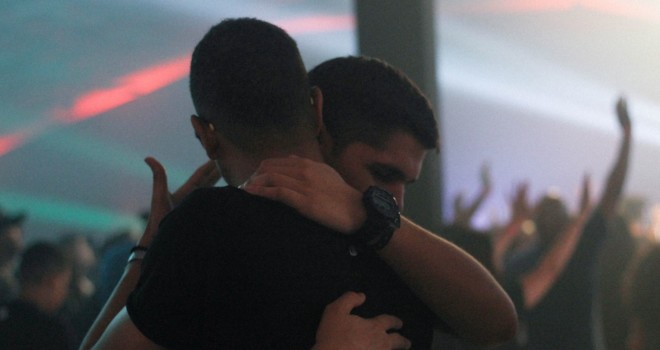
I do not have any biological brothers, but I do have 5 sons. In my fraternal poverty (biological speaking), however, I have learned its value, learning through fraternal bonds with other men how important brotherhood is. And, conversely, seeing the battles and fights that arise between my sons shows the other side of the blessing – the tensions and meanness that seems strangely tied to brothers.
It’s hard to exaggerate how important fraternity is in the Scriptures, both the power of it and the power of it to destroy when it is divided, when brotherliness dissolves into enmity. Right at the very beginning, following hard on the heels of Adam and Eve mistrusting God, fraternal division becomes manifest in the murder of Abel by Cain.
In fact, people often speak of “the fall” when talking about Adam and Eve eating the fruit, but the word “fall” is not actually used until describing Cain’s jealousy toward Abel when it says “his countenance fell” while he was stewing about how God seemed to prefer Abel over him (because he had brought an unworthy offering). At that point God speaks to Cain, warning him that sin is “crouching” in wait. But Cain does not heed God’s word, ignoring him totally in fact, and murders Cain. We could almost look at that incident as a sort of “final nail” of sin’s overtaking of man, when the sons (brothers) of man kill each other and sin’s disorder and horror becomes multi-generational. It is only after Adam has more sons and they have sons that men begin again to “call upon the name of the Lord” (see Gen 4:25-26). This is why fatherhood, brotherhood, and sonship are inherently tied up with salvation and reversing the curse of sin.
As the story of salvation unfolds brotherhood continues as a central part of the narrative. The broadly defined unity in the nation of Israel – the brotherhood of God’s people – is a sign of faithfulness. Division is a sign of unfaithfulness. When the Kingdom of Israel is divided it is identified by tribe, because the particular tribes within the unity of Israel are descendants of Joseph and his brothers, the sons of Jacob, whose story is wrapped up in the fraternal discord and unity with his brother Esau. Later we see divisions amongst the sons of David and the eventual breakdown of unity when Jerusalem alone is left under the rule of David’s dynasty, which was a gift and promise of God.
Arriving at the New Testament we can see how a Jew in Jesus’ day would have felt the gravity of parables like the prodigal son, which was more aptly called “the parable of the two brothers” by Pope Emeritus Benedict XVI. Yes, we see the unfaithful filiality of the prodigal son, but the stage of the story is shared by the other brother who is torn about the return of his wayward sibling. He was, after all, the faithful one for whom no party was thrown.
In fact, the parable is a twist on a common story in Jesus’ time wherein the father does not receive back his son, the lesson being “honor your father or else.” Jesus’ alters it to pose the question – not to unfaithful sons but to faithful brothers – “Will you receive back that which was lost (the Gentiles)?” The parable actually doesn’t tell us how the son answered, because it was an open ended question presented to the Scribes and Pharisees – would they in fact receive the mission of Christ to reconcile the brotherhood of man? Would they accept Gentiles into their understanding of being the people of God? Were they open to the universality of the Catholic Church? The tension of who was in and who was out continued into the early Church, even causing some divisions between Peter and Paul.
This brings us seamlessly along to the theology of the Church which is referred to in scripture as “the brotherhood,” not just a club that exemplifies brotherliness. It’s who we are, not merely how we act. Jesus creates two forms of brotherliness with Him. One in the members of His Body (“where two or three are gathered I am there”) and the one established with Himself and those that are suffering and cast-off by society (“whatever you did for the least of these brothers of mine…”). They appear to be in tension, but one can see that, of course, the Church is a brotherhood united in sonship under “Our Father, Who art in heaven…” and that this very Body must see itself as being united in Christ and oriented to those not yet fully “in,” the unbelievers. In other words, the answer to Jesus’ parable is, “yes, we will be ‘us’ and also seek to save those that are not yet ‘of our number,’ as scripture described.” The mission of Christ is fraternal, to unite to man as a Divine Brother (Heb. 2:11) and then through them to unite them all in Christ (Eph. 1:10).
This is why division is so dangerous, perhaps the most grave warning being when Christ says that he who is unjustly angry and accusatory with his brother “shall be in danger of hellfire” (Matt. 5:22).
Thus, because faith is a virtue that helps us to see as God sees, it sees the central mission of Christ to reconcile men to Himself and to each other – these two unions go hand in hand. And, since faith orients us outwardly it doesn’t compel us to go out and “reconcile” by making people know how they have offended us (though confronting others when they do sin against us is permissible), but by searching diligently for faults within ourselves, for ways we have manifestly hurt or sinned against a brother. But, that’s only the beginning. Once the fault is realized one is obliged to seek reconciliation by actually repenting to the other person and seeking to be at peace with them.
As our Lord says, we should leave our gifts at the altar if we think we have committed a fault against our neighbor, and only return when we are reconciled (Matt. 5:25-16). “It is not, If thou hast ought against thy brother [i.e. have been done wrong],” says St. Jerome, “but, If thy brother has ought against thee, that the necessity of reconciliation may be more imperative.” As St. Augustine says, if we have been sinned against, “we only need for forgive” to approach the altar (“…forgive us our trespasses as we forgive…”). If we cause harm, however, we must make it right. It is faith, seeing ourselves and our brothers in the light of truth, that compels us to be reconciled with our brother, which is deeper than pesky desire to be liked.
In light of the long history of fraternity and faith, we understand why this is so important – brotherhood itself is tied to salvation. “Hence then consider how great an evil is strife,” says St. Gregory the Great, “which throws away what should be the means of remission of sin.” Yes indeed, brotherhood is powerful. This is why reconciliation amongst brothers is no small matter.
The post Reconcile With Your Brothers (And Avoid Hellfire!) appeared first on Those Catholic Men.
This article is reprinted with permission from our friends at Those Catholic Men.












